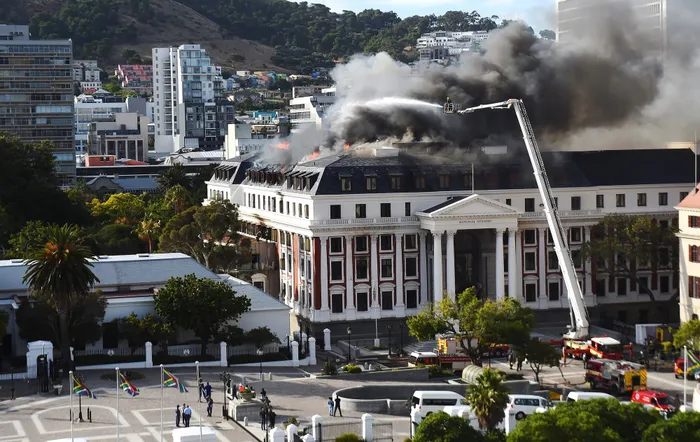Whose Parliament is it anyway?

Picture: Phando Jikelo/African News Agency (ANA) - JANUARY 2, marked exactly a year since a blaze gutted the National Assembly chamber and destroyed sections of the Old Assembly building. The fire also affected key offices includingn chambers and meeting rooms. This resulted in the 2022 State of the Nation Address (Sona) being moved to Cape Town City Hall, a first in the history of South Africa’s constitutional democracy.
By Kim Heller
FIRE holds no vigil for heritage or history. For it is in that ungovernable spark of a single flame that the most ancient and grandiose historical buildings can be caught and burnt to shards. Ages of physical history can be erased in a minute in the valour of a blaze.
The fire which gutted South Africa’s Parliament just two days into January last year, paid little heed to the official declaration of Parliament as a national heritage site.
The fire’s flames did not pause to contemplate the momentous historical acts of grave inhumanity and humanity that the Parliamentary House had borne witness to over the various epochs of South Africa’s history.
The furious flames turned pillar to ash. The Parliament’s fire sprinklers which should have prevented the spread of the fire had not been serviced for seven years and lay defunct and haplessly amid the ruins of the day.
That basic safety protocols were not upheld in the nation’s most important House should sound a loud nationwide alarm; neglect and negligence are fast becoming the real speaker of the ANC governance.
A total of R2billion has now been set aside for the reconstruction of the damaged sections of Parliament.
The history of South Africa’s Parliament is largely that of cruelty. It was within the hallowed halls of Parliament that the major pillars of white rule and supremacy were built on the architecture of racist legislation.
Black South Africans were rendered as second-rate citizens in their own country. Abominable laws included the Prohibition of Mixed Marriages Act, Group Areas Act and Population Registration Act, all officially adopted by the ruling National Party, and swiftly inscribed into the daily lives of citizens.
Parliament was unashamedly a bastion of whiteness and the government of the day; the National Party used its majority and supreme state power to uplift its chief constituency; the Afrikaners. It was only in the last decade of apartheid that political participation was extended to coloured and Indian citizens. It was truly clear in the apartheid era whose Parliament it was, and whose Parliament it was not.
When the ANC government was to gain political power, the vision was for Parliament to become the chamber representing the needs, aspirations and dreams of all South Africans, especially black South Africans who had had no voice in Parliament prior to 1994.
The Speaker in President Mandela’s Parliament, Dr Frene Ginwala wrote of how “it suddenly hit me that this was our Parliament. Change had come, in a very real sense.”
Dr Ginwala continued “This new institution had to be changed in its entirety.”
But in democratic South Africa, the Parliamentary buildings stood intact as an everyday monument and reminder of South Africa’s colonial past.
In many ways the apartheid government bequeathed the ANC with a politically hobbled Parliament, whose reach and will was curtailed under the starter-gun of judicial overreach.
And as usual, the ANC fell for this in a negotiated settlement not entirely of its making.
Dismantling parliamentary sovereignty was a winning strategy of white economic masters who have managed to stay in the winning lane in the race for power in democratic South Africa.
While no empty shell, South Africa’s Parliament of today is far from being a fully active chamber of people’s power, as envisaged. For all its seeming political might, it has not fundamentally transformed or improved the economic and cultural well-being of its citizens.
The desperate apartheid spawned material conditions of the majority of black South Africans remain intact.
That land has yet to be returned to black South Africans is a testament that the ANC’s Parliamentary majority had little political potency or muster.
Unlike its predecessor, the National Party, the ANC has not managed to leverage state power to make giant strides in the upliftment and empowerment of its key constituency. This was due to a cleverly engineered design fault of the negotiated settlement, which weakened the stretch of political power.
Black liberators focused on political office, the white oppressor on economic power.
In the astute observation of Audre Lorde, “the master’s tools will never dismantle the master’s house... they will never enable us to bring about genuine change.”
As for the future of Parliament, the issue goes well beyond relocation or rebuilding. There should be reflections on the very nature of our democracy and our specific modality of “bourgeois parliamentarism”, described by Vladimir Lenin “as a system of governance in constitutional monarchies and democratic republics that allows the ruling class to repress and crush the people.”
But Parliament is likely to be rebuilt without much alteration or change.
This in part is dictated by heritage provisions geared at preserving the national heritage sites.
It is a pity for true heritage is not the antiquity of a long-forgotten generation, nor does it vest, generation upon generation, passively and unresponsively, in the ominous halls of a country’s Parliament.
Rather, the true heritage of a country is the unconquerable, easy fuelled breath of a nation’s people. A fire- proofed energy of people power, that no fire can destroy, or gut.
It is this spirit that should infuse the House of Parliament; wherever it is located, or whatever its architectural frame. The unrestrained clarinet sound of the voice of the people is, in a working democracy, the fire of Parliament.
Heller is a Political analyst and author of ‘No White Lies: Black Politics and White Power in South Africa’
This article is exclusive to The African. To republish, see terms and conditions.